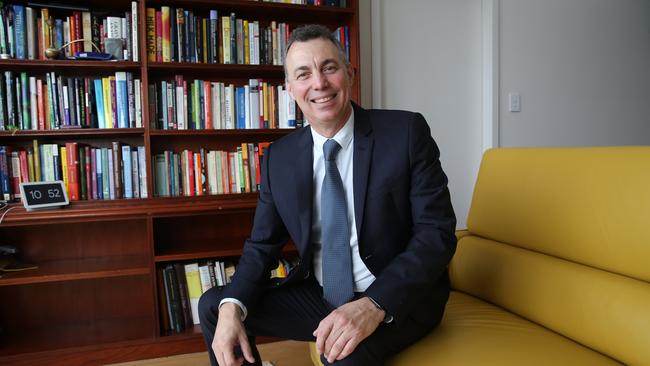High demand, high wages for postgrads who choose tech
Whether they are re-skillers or up-skillers, those who choose technology and engineering can win big in the job market.

Leonardo da Vinci knew a thing or two about science, technology, engineering, maths and art. He also knew about the value of education. “Learning is the only thing the mind never exhausts, never fears, and never regrets,” he once wrote.
Certainly, a new report, ‘Where to now? Blended Futures’ from the consulting group Deloitte found 84 per cent of postgraduate students are satisfied with their study experience. That’s a promising statistic, given that nine in 10 students enrol in postgraduate studies for career purposes.
Postgraduate students in engineering and information technology tend to fall into one of two camps: they are either upskilling in their area of expertise to keep abreast of advances in technology and emerging fields; or they are reskilling and looking to move from one sector or skill set to an entirely different one.
The reskillers make up a large cohort of Edith Cowan University’s online masters program in cyber security, says Paul Haskell-Dowling, associate dean of computing and security at the university. And there is surprising diversity among the student cohort.
“Based on the Hollywood version of cyber-security, a lot of people think it is about sitting behind a screen, typing away until all hours, working nights and weekends – the hoodie huddled over a keyboard,” Associate Professor Haskell-Dowling says.
“And while a lot of our students come with a technical background, the reality is that the majority of problems in cyber security are not about technology, but about people. What we need in cyber is people with a wide variety of backgrounds.”
To that end, Edith Cowan University actively recruits people — especially women — with a range of experiences, including those with a degree in the humanities, such as psychologists, teachers and educators. A diversity of approaches and breadth of experience can “make a huge difference to the industry”, Associate Professor Haskell-Dowling says.
“Of course, understanding the technology is critical to the sector but it’s also about being able to communicate to others, communicate within business, and providing education into senior management because there is a lack of awareness and understanding of cyber and the very critical relationship between people and technology,” he says.
Across the other side of the country, at UNSW, the majority of masters students in that institution’s IT and engineering programs are reskillers — professionals with a cognate undergraduate degree who are trying to shift their career focus or looking to move into executive roles, says Maurice Pagnucco, deputy dean (education) with NSW Engineering.
UNSW has the largest — and most highly ranked — engineering school in Australia. And one of the challenges it, and other universities, are tackling is how to teach in intensely technical areas that are constantly evolving. In other words, universities can’t just teach specific technical skills because they will likely be obsolete by the time the students has graduated.
“What we try to teach is high-level concepts. Graduates should be able to adapt to conceptual understandings as they move from one tool to another,” Professor Pagnucco says.
There is plenty of evidence to suggest an investment in any postgraduate degree in science, engineering, technology and mathematics (STEM) is likely to pay off. A 2020 report from the Office of the Chief Scientist found that between 2006-2016 the size of the workforce for university-educated STEM graduates grew by an astonishing 62 per cent.
Another report from Deloitte and the Australian Computer Society, Digital Pulse 2020, estimated that demand for technology workers will grow by 100,000 between 2018 and 2024.
“The largest increase in technology workers is expected in ICT-related industry areas, where demand will increase by over 43,000 by 2024 in trend terms. The health care industry is forecast to see the fastest technology workforce growth, at 7.3 per cent per annum and adding more than 9000 technology workers over this period,” the report found.
Looking outside Australia, global demand is rising at an exponential rate, with current demand in the Asia Pacific region for cyber experts alone is in the order of 1 million plus jobs and talk estimates of a global demand in the vicinity of six to 10 million vacancies in the coming years, says ECU’s Associate Professor Haskell-Dowling.
Somewhat unsurprisingly, salaries are also buoyant. The Deloitte/ACS report says that there are more STEM graduates than those with non-STEM graduates in the highest income bracket ($104,000 or above) with 34 per cent of the university STEM-qualified population earning over that amount.
Salaries are being pushed ever upwards by vast skill shortages.
“One of the big problems the industry is facing is a fundamental shortage of cyber graduates,” Professor Haskell-Dowling says.
“Unfortunately, many of the cyber courses on offer are not what we would generally consider to be cyber courses — they are computing science courses with a bit of cyber. Employers are catching on to that.
“The other problem is that while there is big demand for entry-level skills, there is also huge demand for senior skills. The industry hasn’t been around for long so there aren’t many people at manager or executive level.”
That means career trajectories can be “quite rapid”.
“Within a year or two they (graduates) are being headhunted for positions and then they go on an upward spiral of moving between companies with commensurate salary increases,” Professor Haskell-Dowling says.
Over at UNSW Professor Pagnucco says it is common for masters engineering students to re-skill from traditional areas into ones with high demand, including cyber.
But also in high demand among masters students is data science, artificial intelligence, automation, robotics and humanitarian engineering, that is engineering that has highly beneficial widespread societal impacts, such as in the environment, food and water security fields.

To join the conversation, please log in. Don't have an account? Register
Join the conversation, you are commenting as Logout